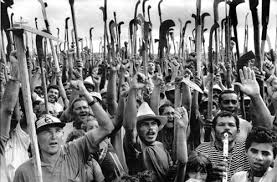UN as Police and Criminals
Today's Democracy Now! featured an interview with journalist Reed Lindsay in Haiti.
Lindsay reports that:
...the latest happening here is yesterday there was a sit-in, or so they called it. It was a demonstration organized by the Group of 184 in front of the United Nations to protest what they feel is a lack of U.N. action in the face of recent kidnappings and to call for stronger action in Cite Soleil, to lift Cite Soleil, or as Reginald Boulos, the President of the Chamber of Commerce said, to “cleanse” Cite Soleil of criminals there.
For those who don't recall, the Group of 184 was an instrumental part of the civil society opposition to Aristide's presidency. An article by Michel Chossudovsky in Global Research ["The Destabilization of Haiti," 29 February 2004] provides further background:
The Group of 184 (G-184), is headed by Andre (Andy) Apaid, a US citizen of Haitian parents, born in the US. (Haiti Progres, http://www.haiti-progres.com/eng11-12.html ) Andy Apaid owns Alpha Industries, one of Haiti's largest cheap labor export assembly lines established during the Duvalier era. His sweatshop factories produce textile products and assemble electronic products for a number of US firms including Sperry/Unisys, IBM, Remington and Honeywell. Apaid is the largest industrial employer in Haiti with a workforce of some 4000 workers. Wages paid in Andy Apaid's factories are as low as 68 cents a day. (Miami Times, 26 Feb 2004). The current minimum wage is of the order of $1.50 a day:
"The U.S.-based National Labor Committee, which first revealed the Kathie Lee Gifford sweat shop scandal, reported several years ago that Apaid's factories in Haiti's free trade zone often pay below the minimum wage and that his employees are forced to work 78-hour weeks." (Daily News, New York, 24 Feb 2004)
Apaid was a firm supporter of the 1991 military coup. Both the Convergence démocratique and the G-184 have links to the FLRN (former FRAPH death squadrons) headed by Guy Philippe. The FLRN is also known to receive funding from the Haitian business community.
In other words, there is no watertight division between the civilian opposition, which claims to be non-violent and the FLRN paramilitary. The FLRN is collaborating with the so-called "Democratic Platform."
Lindsay told Amy Goodman:
I was in Cite Soleil the other day, and the hospital there, the public hospital -- it’s the only public hospital in Cite Soleil; it’s an enormous neighborhood -- has received a record number of bullet wound victims the last month and a half, about nearly 100 since the beginning of December, and they keep coming in every day. And you go into the hospital, the wing of the hospital where the bullet wound victims are, and every single one [inaudible], they say they’ve been shot by the United Nations, and [no audio]
AMY GOODMAN: Reed, are you there?
REED LINDSAY: -- It’s difficult to prove whether it’s the U.N. that’s shooting them. But on the other hand, with the amount of shooting that is going on every day, I think that some of these people, you have to believe what they're saying.
In other words, a group involved in the overthrow of the legitimate government and the installation of a regime of gross human rights abuses and a murderous U.N. occupation then calls upon the UN to be more zealous in cracking down on a crime wave perpetrated, in part at least, by... the UN.



1 Comments:
Unfortunately, Reed Lindsay has disappointed us all and turned into an apologist for UN operations in Haiti. It is perhaps because he now has a vested interest by virtue of a NGO largely funded by his mother in Haiti. NGOs by definition have a vested interest in stability and presenting a rosy picture while the reality is otherwise.
http://haitiaction.net/News/HIP/4_13_8/4_13_8.html
The dire situation of Haiti's poor went largely ignored by Alexis' government and the United Nations. International press reports in the months leading to the open rebellion against hunger in the streets led casual observers to believe the situation was normalizing. The international press actually helped to obscure the reality of hunger and misery in Haiti. On March 8. 2008, Reed Lindsay reported in the Washington Times, "U.N. peacekeepers in Haiti say they are battling an image of fear that is keeping the Caribbean nation mired in hunger and disease, with little hope of attracting foreign visitors and investment.' Lindsay's fundamental point being that the only thing standing between Haiti and prosperity was merely the perception of ‘hunger and disease.'
Post a Comment
<< Home